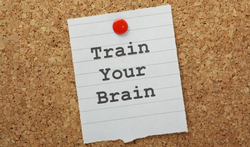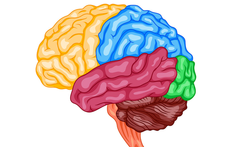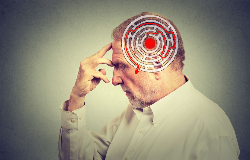Forty percent of the population between 25 and 85 years old complains of forgetfulness and about 8 percent are seriously concerned about that. This is the conclusion of research by the memory outpatient clinic of the Dutch University of Limburg. The people who found themselves very forgetful were subjected to all kinds of memory tests. The result: for most of them, that forgetfulness was not too bad.
The fear of mental decay and diseases such as Alzheimer's makes it easy for the elderly in particular to fixate on memory complaints and quickly panic when they become somewhat forgetful.
Most of the time, however, this is unjustified and is an innocent and natural phenomenon. The speed at which information can be processed decreases somewhat with age. The storage space in the so-called working memory or the short-term memory will also be reduced. Finally, one can concentrate less time with age. However, the latter has not so much to do with memory, but with the fact that one gets tired faster. All these elements together mean that one can store less information and also less easily re-recall it.
Incidentally, memory, and especially the speed at which information can be processed, gradually deteriorates from the age of 25 or 30.
However, memory complaints are not always banal. Sometimes there are health problems behind the forgetfulness. It can indeed be an incipient dementia. But also to a depression or a mood disorder as a result of an unpleasant or sad event (such as the death of a partner). On the other hand, real defects in the brain, e.g. as a result of a stroke, are rarely at the basis of a malfunctioning memory.
Memory courses

Memory workouts do not improve memory on their own. Such courses offer participants strategies and techniques that teach them how to better handle their memory, which can facilitate the recording and/or retrieval of information and compensate for any shortages. Most memory courses are based on the CASSA model, which stands for Concentration, Associating, Structuring, Selecting and Accepting.
- Concentration is a prerequisite for remembering something. Without interest and alertness, the information offered goes in one ear and out the other, while nothing is stored in between. Repeating things over and over again - the name of individuals or of a medicine, phone numbers, etc. - is a tried and tested means of remembering them.
- Making associations is another excellent tool to save information. Take, for example, the number of your bank card and try to find a mathematical formula in it; for example: the sum of the first two digits is equal to the third minus the fourth digit. Or maybe you can relate the numbers to the year of birth of yourself or of your children. If it is difficult to remember names, it can help, for example, to make a connection between a name and a certain characteristic of that person (Degrande is e.g. 'big') or with another word with the same sound (e.g. Roeykens with rowing).
- Structuring is a third trick. On your imaginary shopping list, put together things in groups that belong together: apples and pears,lettuce and beans, cola and beer, etc. • Selecting: in the end, it is rarely necessary to remember everything and one can better focus on some important points.
- Accepting one's own limitations is also a final important point of attention of a good memory course. Do you systematically forget everything when shopping? Then, for example, use a shopping list.
You'll get there in the end
Memory courses have a theoretical and a practical part. Information is given about the functioning of memory, about the difference between normal and abnormal forgetfulness and sometimes also about Alzheimer's disease. For many people, it is often quite reassuring to learn that their forgetfulness is a normal phenomenon of old age and not an omen of an inevitable deterioration process. During such a course, the participants are also given the opportunity to compare their memory complaints with those of their peers, so that they get a more realistic picture of their own abilities. Perhaps this is where the most important usefulness of such courses lies: that the participants learn to live with their limitations and feel more secure again.
Finally, there is the practical part. During the course, all kinds of exercises are done on the basis of which the functioning of memory is explained and in which the CASSA principles are taught. Memory courses are ideal for troubled elderly people with normal forgetfulness. On the contrary, they are absolutely unsuitable and even inadvisable for people with real memory disorders as a result of an illness, such as a stroke, depression or incipient dementia. If you are worried about memory problems, it is therefore best to consult your doctor first.
Lots of memories

Instead of talking about 'the memory' one would better speak about 'the memories', in the plural.
Because there are different memory systems and memory processes.
To put it simply, one can distinguish between four different memory systems, each of which has a different function, which differ in the nature and quantity of information they can process and hold and in the length of time in which that information can be stored. There are also different processes at play.
- Sensory memory
A first system, sensory memory, registers the information that reaches us through our senses, everything that we see, feel, hear, smell and taste.
For example, it allows us to bring the sounds we hear during a conversation together into certain sound sequences (not yet to words or sentences!). The amount of information it can absorb is very limited and only short-lived (at most a few seconds). - Short-term memory (or working memory)
After the information has passed through the sensory memory, it can arrive in the working memory, also called 'short-term memory'.
Here, that information is edited before it is permanently stored. It allows us, for example, to look up a telephone number in the phone book and remember it for enough time to form the number. Maybe we should repeat the song a few times and save it to our working memory.
This memory is also limited in storage capacity (just try to read a series of digits and then repeat them) and in storage time. Not repeated data disappears after about 20 seconds, but usually even faster because newly incoming information displaces the older information, as it were.
The speed at which working memory processes the information, which is important for the amount of operations that can take place within a certain time, differs from person to person. People with a high working speed will be able to process more information at the same time and also respond better to information that is offered at a high pace. - The long-term memory
The information that is worthwhile and that we process in one way or another is stored in the third system, the long-term memory.
Also strongly emotionally charged events are recorded in this memory. It features an unlimited storage space in which the information is stored almost endlessly. So it never gets full, no matter how old one gets, and the information is not erased. However, the information may become more difficult to access. For example, think of certain words from a dialect or a language that you do not use on a daily basis: apparently you have forgotten them, but if someone uses the word, you will remember it.
That 'forgetting' is at least as important as 'preserving'. If we kept all the information that is stored, everything we think, feel and experience, in the same active way so that it can be called up at all times, then we might go crazy.
Within this long-term memory one distinguishestwo major forms of information storage:- the procedural memory is the memory for procedures, how to do something. How to cycle, for example
- the procedural memory is the memory for procedures, how to do something. How to cycle, for example.
- The autobiographical memory.
Finally, there is autobiographical memory, which is sometimes also considered a part of episodic memory. This is where our personal history, our autobiography is stored. Curiously, we have almost no personal memories of our first three years, while our procedural and semantic memory will hold certain events from that time (e.g. learning to walk upright). It is also remarkable that events from the distant past and from the present are especially important for this memory.
Take care of your memory

A healthy mind in a healthy body. This saying also applies to your memory.
- Senses
The more senses we use to perceive something, the better we will remember that information.
If a certain sense is not functioning as well, then we will try to compensate for that. For example, a blind person will record more information through his hearing.
In order to be able to use the memory as well as possible, it is therefore important to use all the senses.
If you want to remember something, don't just look at it, but also try to feel, smell or hear it. If your face or hearing deteriorates, make sure you have appropriate glasses, possibly hearing aid, etc. - Physical condition
Those who are tired, do not feel well, etc., will be less able to concentrate and therefore remember less well.
A healthy diet with lots of fruits and vegetables and regular exercise not only makes you feel better physically, but also ensures better blood flow and oxygen supply to the brain. - Spiritual balance
When you are tense, worried, worrying a lot, mourning the loss of a loved one, etc., then you will also be less able to concentrate and your memory will let you down.
Some medicines (e.g. sleeping pills) can negatively affect your memory.
Alcohol also has a negative impact on memory. - Prior knowledge
The knowledge we have can influence how well we remember certain things.
First, there is the element of intelligence. People with high (verbal) intelligence remember texts better than less (verbally) intelligent people. This has to do with the fact that they understand better, make connections faster, can structure better, etc. This effect becomes stronger with age. Perhaps because (verbally) intelligent people read more and therefore practice more in processing data.
On the other hand, people will remember those things that interest them, with which they can do something, or about which they already know something.
The importance of prior knowledge is also very important in this context. Research has shown, for example, that French chefs remember recipes better for French recipes than for Chinese ones, or that chess masters remember positions better than novices.
This is because they can hook the new knowledge into an already existing network. Beginners don't have that advantage.
For these reasons, it is important to remain mentally active even when one gets old. Not so much because this would keep one's memory up to date, but because it would allow one to continue to process the information flows better, which indirectly benefits the memory.




